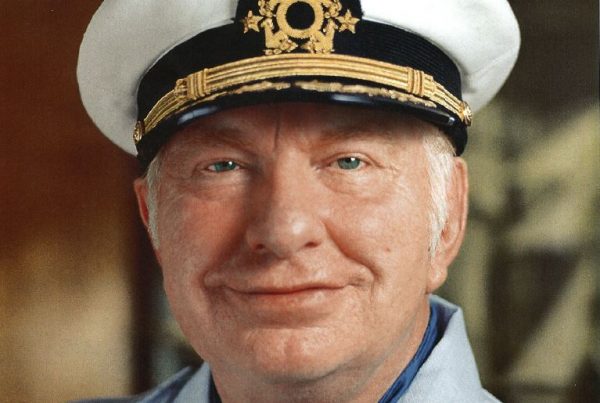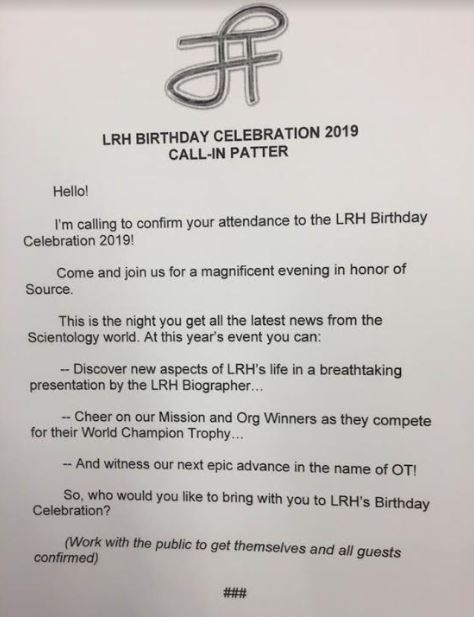
Chris Shelton had fun with L. Ron Hubbard’s ‘Axioms’ on Friday. Now, he takes another one for the team and tries to deal with the illogic of Hubbard’s ‘Logics.’
It’s a funny thing that lately it’s been more and more difficult for me to make sense of L. Ron Hubbard’s gibberish. This is inconvenient since I have made it a part of my life to criticize his writings and therefore, from time to time, I do have to actually go back and read the stuff. Going back into this stuff feels like the proverbial frog in the slowly boiling pot. The mind reels from the senseless generalities and bizarre conclusions Hubbard draws from the everyday vicissitudes of our flawed human lives.
For example, in a lecture given on April 16, 1959 called “Axioms, Second Lecture,” Hubbard asserts that a man who can’t keep the differences straight between a Gothic arch and arches from the Renaissance is having this difficulty because his entire education has somehow magically been crushed together into an incomprehensible mass.
“And the fellow is doing a skid. Maybe the first time he ever studied architecture or the first time he ever built a church or anything like that, why, it was a whole bunch of Gothic arches, you see? And he’s got experiences. He’s got knowledge all mixed up with a Gothic arch. Now he’s got to forget it all before he can remember it. See, if he knew it, he would just keep on knowing it. But he’s gone through all the mechanism of forgetting it, which is the Third Postulate. Now he tries to do the Fourth Postulate of ‘remember,’ which remembers through forgettingness, you see, in order to know again.” (from a lecture of April 16, 1959: “Axioms, Second Lecture”)
Somehow this blather is supposed to actually make sense and at one time, I actually thought it did. I’m not really down on myself now over any of this, just commenting on the fact that one of the most amazing (and tragic) things about our minds is that we can make almost anything make a kind of sense to ourselves if we really want to.
If we walk through the latest edition of Scientology 0-8: The Book of Basics, we see a kind of progression in thought through Hubbard’s early works, supposedly laying the groundwork for all of Dianetics and Scientology. Of course, most of this was reverse engineered from Hubbard’s observations, “discoveries” and opinions (most especially the latter). Hubbard’s claims are so laughably poor and weakly constructed, taking them apart is not difficult.
Hubbard started with some “axioms” from his original work on Dianetics (Dianetics: The Original Thesis). Of these he said, “Workability rather than Truth has been consulted. The only claim made for these axioms is that by their use certain definite and predictable results can be obtained.” If you think it’s a good idea to put people into hypnotic trances and command them at your will, then I guess you could count on certain results being obtained but I wouldn’t look for any miracle cures or mental health procedures there. A certain percent of the population responds positively to ANYTHING you do to them.
This is called the placebo effect and it’s something Hubbard took advantage of all the time. Following this, we have a few more modifications and new axioms and definitions presented in Dianetics: The Modern Science of Mental Health. These are mostly definitions and statements of opinion rather than axioms with scientific merit. For example, “The Dynamic Principle of Existence is SURVIVE!” sounds nice and authoritative but doesn’t work out at all when compared with what goes on with life organisms in the real world. To cite just one exception, and one that has entangled evolutionary biologists for years, what about when an animal purposefully sacrifices itself for the sake of altruism or honor or duty or so that others might live? This is hardly the principle of “survive” in action unless we take a great many other things into account, which Hubbard never did.
In a lecture called “Educational Dianetics” in August of 1950, Hubbard offered up the “Educational Axioms of Dianetics.” Most of this material appears to be a rant against organized education, something Hubbard absolutely hated as witness by his failing grades and inability to even complete college. These educational axioms include such witticisms as “A datum is valid only when it can be sensed, measured or experienced.” I’d say a datum doesn’t even exist if it can’t be sensed, measured or experienced.
Gauging the validity of non-existent data is not something I think many of us need concern ourselves with. Next up came the Logics and Axioms of Dianetics, released in November of 1951 in the book Advanced Procedure and Axioms. We looked at the Axioms of Dianetics in my last article, so now let’s take a look at these Logics. These appear to be Hubbard’s first stab at describing how to think and reason, something he expand upon greatly many years later with the Data Series (which I have already deconstructed in my Basics of Scientology video series).
Let’s start at the beginning with Logic 1: “Knowledge is a whole group or subdivision of a group of data or speculations or conclusions on data or methods of gaining data.” Ok, so when we are talking about knowledge, we are talking about data or opinions about data or ways of getting data. This is really just a re-wording of a standard dictionary definition, so there’s nothing very controversial or original here. If Hubbard had something new to bring to the table, it perhaps would have made this Logic necessary or useful. But let’s continue and see if he actually goes anywhere with this.
Logic 2 says “A body of knowledge is a body of data, aligned or unaligned, or methods of gaining data.” I’d be much obliged if anyone wants to tell me what the difference is between Logic 1 and Logic 2. I put my smartest thinking cap on and couldn’t see any real difference in what these two things are saying.
I don’t want to be too dismissive here. It is important to define one’s terms. Creating an integrated, internally consistent and logical system of thought is not an easy task and very few people in history have even attempted it, so I really do want to give Hubbard the benefit of the doubt here that he could be on to something. But these are just too pedestrian, too simplistic, to be taken seriously. There’s a kind of pompousness reflected in this writing that makes it too easy to show up Hubbard for what he really is: a struggling con man trying to wear the hat of a faux-philosopher to sell some blue sky to some gullible folks. If only more people could have seen that back in 1951, the world would be a slightly better place now. But I digress. Let’s continue.
Logic 3 says “Any knowledge which can be sensed, measured or experienced by any entity is capable of influencing that entity.” This is perhaps one of the most obvious things that could be said about anything, not just knowledge. By the mere awareness of a thing, we are influenced by it. This is hardly a revelatory or necessary thing to say. However, Hubbard then writes a corollary to Logic 3 which is where things start to go from pedantic to ridiculous: “That knowledge which cannot be sensed, measured or experienced by any entity or type of entity cannot influence that entity or type of entity.”
OK, so if I’m looking at this in the context and terms of what it says, and if I can then still think of a single example that shows this not to be true, it blows the whole thing out of the water, right? So, can I do that? You bet.
How about a 2-month old baby who is ready for his or her first immunizations? This baby has no idea what is about to happen to him and no amount of coddling or talking or pictures are going to give him that idea because a 2-month old is wholly incapable of that level of understanding. There are whole volumes of knowledge about vaccines and immunization and disease which this baby has no clue of but all of which can very much influence his young life. If he were to catch measles, he wouldn’t understand that or why his body hurt or why he was suffering so much; and yet, that ignorance wouldn’t stop the disease or even give it pause to wonder if this little body it was infesting was aware of the disease’s existence.
Hubbard seems to think that if black is true, white must be true too. This is what I mean by his sloppy thinking. There really is no reason for this “corollary” to even exist since nothing that comes later depends on it and it does not integrate well at all in the real world (as I showed above).
Logic 4 says “A datum is a facsimile of states of being, states of not being, actions or inactions, conclusions or suppositions in the physical or any other universe.” If I bust out my Oxford English Dictionary, it tells me that a datum is “a piece of information.” It’s also “an assumption or premise from which inferences may be drawn.” I think that’s a simpler way of saying it, don’t you?
There’s a point that could be made here where Hubbard says “a datum is a facsimile” since by facsimile Hubbard is referring to Dianetics vocabulary. A facsimile is a mental image picture, which to Hubbard’s way of thinking is a mental “copy” of an exact instant in the physical universe. Stored in three dimensions and with all the perceptics available to the person at the time (sight, smell, taste, weight, etc), Hubbard claimed (without any testing or proof) that we make 72 of these facsimiles every second. All of these are stored using mental energy since the brain apparently can’t hold that much. So, all data that exists anywhere, according to this Logic, is only stored in our minds.
This would be a highly debatable point in any Rhetoric or Philosophy 101 class, similar to such questions as whether Objective Truth is a thing or if our morality is determined by our religion or our religion is determined by our morality. Data could be considered to only be data because of our perception and evaluation of it, but I reject this idea personally. I think that data, as defined earlier, exists regardless of whether we perceive or are aware of it or not. And as I pointed out above, things can have an effect on us regardless of whether we are aware of or perceive those things. This throws Hubbard’s Logic 4 off kilter. I’m pretty sure that is what he’s saying and I’m therefore pretty sure he’s full of it. Let’s take a look at one more.
Logic 5 says “A definition of terms is necessary to the alignment, statement and resolution of suppositions, observations, problems and solutions and their communication.” Hubbard is talking here about different ways of defining a concept or idea. He says you can describe it by (a) things it’s similar to, (b) things it’s different from, (c) things it’s connected/associated with, or (d) what it actually does or how it exists in terms of its state of being. And it was interesting how much Hubbard patted himself on the back about this when lecturing for the first time about these in 1951. No other philosophers or scientists in history I could find anywhere had made such distinctions about definitions and it appears to me to not only be unnecessary but actually a bit ridiculous.
There’s a philosophical component here which I think may make it clear why Hubbard thought this was even something to do and it has to do with a point I brought up in my earlier article: Hubbard was obsessed with the idea of causation. Being “at Cause” in any Cause-Effect relationship was very important to him, especially with the added goal of not becoming the adverse effect of his own cause.
Hubbard dreamed of a life free of consequences and exerted his will over others to create that life. For a short while, he even succeeded with his absolute command over the international Scientology network in the early 1960s, students flooding to England despite having to run an immigration gauntlet, a fledgling spy network so he could flex his muscles at any critics and basically so much money being thrown at him that he would never want for anything again.
This “cause” concept may have been something Hubbard created on his own, but purely by coincidence I’m sure, this idea is analogous to the early 19th century occult teachings of Aleister Crowley (a/k/a “The Beast”). Crowley wrote a lot of drug-addled nonsense and one of his most famous quotes is “Thou hast no right but to do thy will… For pure will, unassuaged of purpose, delivered from the lust of result, is every way perfect.” While Crowley did talk about remembering one’s sense of decency and honor, he also wrote, “Do what thou wilt shall be the whole of the Law” in his 1904 pamphlet, The Book of the Law. And just to be clear, later in that same book he wrote “There is no law beyond Do what thou wilt. Love is the law, love under will.”
We already know from his Affirmations that Hubbard was suffering from self-loathing, misanthropy and a deep desire to bend other men’s will to his own. I think to a sloppy thinker like Hubbard, his reading of Crowley was that through practicing Magick, he could overcome his doubts, fears and uncertainties, live in tune with his own Guardian Spirit and finally be able to deal with his perceived enemies exactly as he had always dreamed of doing. He believed he would finally be able to live the kind of life he always wanted, one in which people would love, respect, admire and fear him and his Great Works. Of course, Hubbard didn’t actually produce any Great Works, but this didn’t ever stop him for an instant in believing in his own greatness. To his way of thinking, his way was the best way and anyone who got in his road was a simple obstacle to be removed with whatever degree of force was necessary.
After a whirlwind two years of success and fame followed by bankruptcy and divorce, Hubbard found himself in Wichita, patting himself on the back over his personal genius while writing these ridiculous Axioms and Logics. He was able to grow another small following for a while, but Hubbard’s nature always caught up with him. These Logics didn’t create any path to common sense or decency in his twisted little mind and so within a year, he was engaged in more senseless battles with his estranged allies. Don Purcell rued the day he ever staked Hubbard to set up shop in Wichita and was relieved to finally be rid of him. Hubbard relocated once again, this time to Phoenix to start the official Church of Scientology. He spoke only a handful of times about the Axioms and Logics after that. Like so many other things that he invented, after they had outlived their gimmick factor, they were cast on the rubbish heap.
If any of Hubbard’s followers applied even the lightest of critical thinking to these Axioms and Logics, they’d see through this nonsense immediately. Unfortunately, while Hubbard was quite bad at writing sensibly scientific material, he was very good at appealing to people’s emotions, and those are the far more powerful component of anyone’s thinking. If any Scientologist tries to unravel and make sense of these things, they quickly give up and think, “Oh well, maybe after I’m OT I’ll understand them.” Maybe so and I guess if that’s the case, I’ll never understand them either. Oh well.
— Chris Shelton
——————–
Bonus items from our tipsters
This is fun, a script for canvassers trying to get Scientologists to come to the Birthday Event in Clearwater on March 16…

——————–
HOWDYCON UPDATE
We have some news for you about how our plans for this year’s HowdyCon have changed a bit. First, to review: We had decided that because this year we’ll be in Los Angeles, we would coordinate with Janis Gillham Grady, who has an annual reunion barbecue and this year is dedicating her event to former Scientology ED Int Bill Franks, who died in December.
We were hoping to hold that barbecue at a former Scientology mission building in Riverside, but the sheer distance between Los Angeles and Riverside and the lack of public transportation in Southern California made our original plans problematic.
So, we’re still planning on holding events in LA on Thursday and Friday, June 20 and 21, but Janis is now looking for a new location for Saturday’s combined event in Burbank. She also says she will soon have hotel information for those coming in from out of town.
——————–
Scientology’s celebrities, ‘Ideal Orgs,’ and more!
We’ve been building landing pages about David Miscavige’s favorite playthings, including celebrities and ‘Ideal Orgs,’ and we’re hoping you’ll join in and help us gather as much information as we can about them. Head on over and help us with links and photos and comments.
Scientology’s celebrities, from A to Z! Find your favorite Hubbardite celeb at this index page — or suggest someone to add to the list!
Scientology’s ‘Ideal Orgs,’ from one end of the planet to the other! Help us build up pages about each these worldwide locations!
Scientology’s sneaky front groups, spreading the good news about L. Ron Hubbard while pretending to benefit society!
Scientology Lit: Books reviewed or excerpted in our weekly series. How many have you read?
——————–
THE WHOLE TRACK
[ONE year ago] The ‘Brainwashing Manual’ — how a crude Scientology hoax became a far-right touchstone
[TWO years ago] As Scientology shrinks, its leader dreams up new ways to convince followers otherwise
[THREE years ago] When Scientology was in trouble, L. Ron Hubbard told prosecutor he was a ‘psychologist’
[FOUR years ago] When Scientology was pouring on the ‘religious’ angle very thick: A video mystery
[FIVE years ago] Federal judge dismisses Georgia class-action lawsuit against Scientology and rehab network
[SIX years ago] Narconon Staff Certifications in Jeopardy After New Whistleblower Comes Forward
[SEVEN years ago] Scientology Hip Hop: The Melbourne Day Rap Battle Team!
——————–
Bernie Headley has not seen his daughter Stephanie in 5,367 days.
Valerie Haney has not seen her mother Lynne in 1,498 days.
Katrina Reyes has not seen her mother Yelena in 2,000 days
Sylvia Wagner DeWall has not seen her brother Randy in 1,480 days.
Brian Sheen has not seen his grandson Leo in 543 days.
Geoff Levin has not seen his son Collin and daughter Savannah in 431 days.
Christie Collbran has not seen her mother Liz King in 3,738 days.
Clarissa Adams has not seen her parents Walter and Irmin Huber in 1,606 days.
Carol Nyburg has not seen her daughter Nancy in 2,380 days.
Jamie Sorrentini Lugli has not seen her father Irving in 3,154 days.
Quailynn McDaniel has not seen her brother Sean in 2,500 days.
Dylan Gill has not seen his father Russell in 11,066 days.
Melissa Paris has not seen her father Jean-Francois in 6,986 days.
Valeska Paris has not seen her brother Raphael in 3,153 days.
Mirriam Francis has not seen her brother Ben in 2,734 days.
Claudio and Renata Lugli have not seen their son Flavio in 2,994 days.
Sara Goldberg has not seen her daughter Ashley in 2,034 days.
Lori Hodgson has not seen her son Jeremy and daughter Jessica in 1,746 days.
Marie Bilheimer has not seen her mother June in 1,272 days.
Joe Reaiche has not seen his daughter Alanna Masterson in 5,361 days
Derek Bloch has not seen his father Darren in 2,501 days.
Cindy Plahuta has not seen her daughter Kara in 2,821 days.
Roger Weller has not seen his daughter Alyssa in 7,677 days.
Claire Headley has not seen her mother Gen in 2,796 days.
Ramana Dienes-Browning has not seen her mother Jancis in 1,152 days.
Mike Rinder has not seen his son Benjamin and daughter Taryn in 5,454 days.
Brian Sheen has not seen his daughter Spring in 1,560 days.
Skip Young has not seen his daughters Megan and Alexis in 1,963 days.
Mary Kahn has not seen her son Sammy in 1,834 days.
Lois Reisdorf has not seen her son Craig in 1,417 days.
Phil and Willie Jones have not seen their son Mike and daughter Emily in 1,912 days.
Mary Jane Sterne has not seen her daughter Samantha in 2,166 days.
Kate Bornstein has not seen her daughter Jessica in 13,275 days.
——————–
 Posted by Tony Ortega on February 21, 2019 at 07:00
Posted by Tony Ortega on February 21, 2019 at 07:00
E-mail tips to tonyo94 AT gmail DOT com or follow us on Twitter. We also post updates at our Facebook author page. After every new story we send out an alert to our e-mail list and our FB page.
Our new book with Paulette Cooper, Battlefield Scientology: Exposing L. Ron Hubbard’s dangerous ‘religion’ is now on sale at Amazon in paperback and Kindle formats. Our book about Paulette, The Unbreakable Miss Lovely: How the Church of Scientology tried to destroy Paulette Cooper, is on sale at Amazon in paperback, Kindle, and audiobook versions. We’ve posted photographs of Paulette and scenes from her life at a separate location. Reader Sookie put together a complete index. More information can also be found at the book’s dedicated page.
The Best of the Underground Bunker, 1995-2018 Just starting out here? We’ve picked out the most important stories we’ve covered here at the Underground Bunker (2012-2018), The Village Voice (2008-2012), New Times Los Angeles (1999-2002) and the Phoenix New Times (1995-1999)
Other links: BLOGGING DIANETICS: Reading Scientology’s founding text cover to cover | UP THE BRIDGE: Claire Headley and Bruce Hines train us as Scientologists | GETTING OUR ETHICS IN: Jefferson Hawkins explains Scientology’s system of justice | SCIENTOLOGY MYTHBUSTING: Historian Jon Atack discusses key Scientology concepts | Shelly Miscavige, ten years gone | The Lisa McPherson story told in real time | The Cathriona White stories | The Leah Remini ‘Knowledge Reports’ | Hear audio of a Scientology excommunication | Scientology’s little day care of horrors | Whatever happened to Steve Fishman? | Felony charges for Scientology’s drug rehab scam | Why Scientology digs bomb-proof vaults in the desert | PZ Myers reads L. Ron Hubbard’s “A History of Man” | Scientology’s Master Spies | The mystery of the richest Scientologist and his wayward sons | Scientology’s shocking mistreatment of the mentally ill | The Underground Bunker’s Official Theme Song | The Underground Bunker FAQ
Watch our short videos that explain Scientology’s controversies in three minutes or less…
Check your whale level at our dedicated page for status updates, or join us at the Underground Bunker’s Facebook discussion group for more frivolity.

Our non-Scientology stories: Robert Burnham Jr., the man who inscribed the universe | Notorious alt-right inspiration Kevin MacDonald and his theories about Jewish DNA | The selling of the “Phoenix Lights” | Astronomer Harlow Shapley‘s FBI file | Sex, spies, and local TV news | Battling Babe-Hounds: Ross Jeffries v. R. Don Steele









